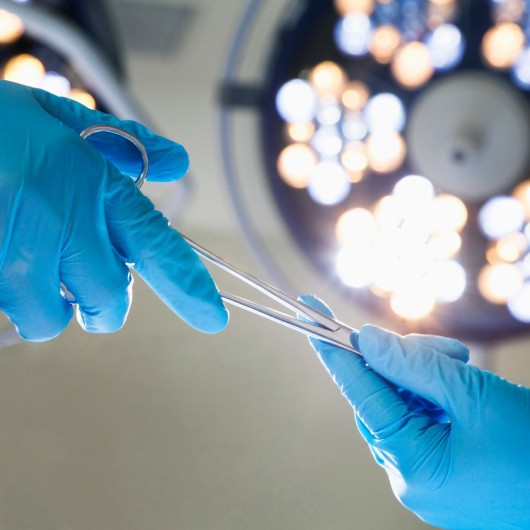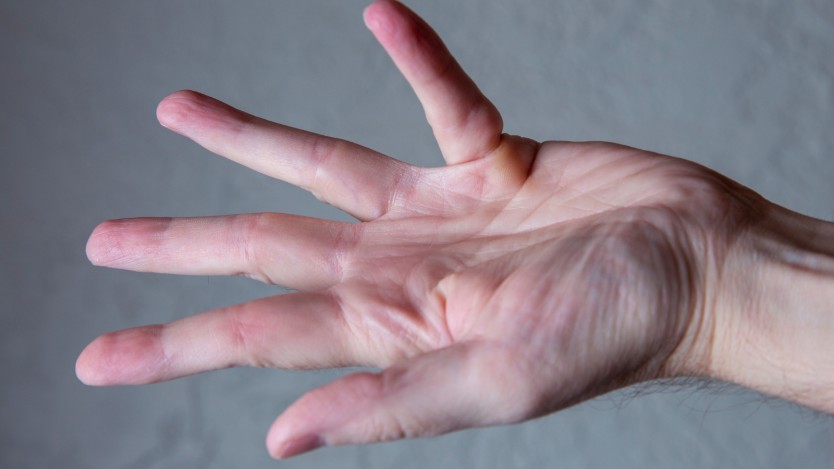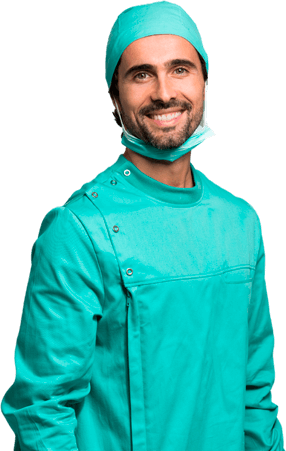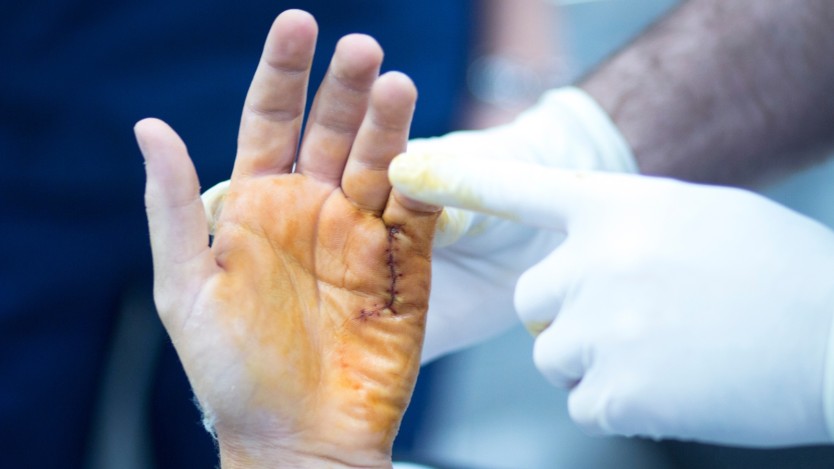
Dupuytren’s Contracture surgery
- Hospital stay: Outpatient surgery
- Surgery time: 30 minutes - 2 hours
- Anaesthesia: Regional/Local
- Full recovery: 6 - 12 weeks
Fixed price
2.490 €
All included
Consult financing conditions
Financing is available* for amounts over €150, and can be financed from 3 and to 24 months. The financing process is subject to approval by the collaborating financial entities. For further information on the financing conditions, please do not hesitate to contact us at +34 91 141 33 56 or through this contact form. Our Patient Service department will provide you with the information you need and explain the financing process. Find additional information about funding in the following link. *Operarme’s team manages the funding of surgical procedures and medical tests. The financing management of dental services is only performed at Caser Dental Clinics.
What do our patients think?
What is included?
-
Free surgical consultation
Ask for a free and immediate surgical consultation with our Specialist in Traumatology and Orthopaedic Surgery.
Meet the doctor on a face-to-face consultation to assess your dupuytren's problem, and then decide together your best options for surgical treatment.
-
Preoperative assessment
A complete preoperative study will be performed: including a blood analysis, electrocardiogram and chest-X rays. Also a consultation with the Anaesthetist will be held to see if you are suitable for the surgery.
-
Surgical procedure expenses and fees
-
Reservation and booking of the operation room, instruments, equipment,consumables and medication of the surgical procedure.
-
Medication (non cytostatic nor monoclonal antibody or derivatives), medical gases, Stay in the postoperative recovery room, monitorization and necessary treatments, Pathological anatomy, haemotherapy-blood transfusions.
-
Surgeon, assistant and anaesthetist fees until your medical discharge.
If there was any special need in the surgical process, by express indication of the doctor, the client will be informed of the variation in the price prior to surgery, and must be accepted to continue with the process.
-
-
Hospital Stay
Fasciectomy is an outpatient surgical procedure.
You will be able to return home the same day as the surgery, after the effects of the anaesthesia wear off and you receive postoperative instructions.
-
Medical complications insurance
Dupuytren's Contracture surgery includes a medical complications insurance covering possible eventualities that may affect the patient during the surgical procedure and 30 days after surgical intervention, including reoperation if needed.
Medical complications insurance covers related surgical procedure expenses, such as:- Increase in your hospital stay after surgery.
- Hospital admission after hospital discharge due to medical complications.
- Re-intervention and hospital stay up to the established amount in the Particular Conditions.
Under no circumstances this insurance will cover emergency visits or medical review consultations after hospital discharge.
If you would like to receive more information about this service, please contact our patient service department.
-
Post-surgical consultation
There is 1 post-surgical consultation included in the closed price of this surgery. If more consultations are necessary, they must be managed through the Operarme patient care team and paid at a preferential price. For more information or request additional consultation, contact our patient service team.
Post-surgical consultations NOT included in the closed price of the surgical process have a price from €39 per appointment.
Information of Dupuytren’s Contracture surgery
- 01. All about surgery for Dupuytren's Contracture
- 02. What is Dupuytren's Contracture?
- 03. Why is Dupuytren's surgery necessary?
- 04. Request a surgical assessment consultation with Operarme
- 05. Assessment appointment with the Trauma specialist
- 06. Surgery to eliminate Dupuytren’s Contracture
- 07. Dupuytren's contracture surgery (fasciectomy): step by step
- 08. Postoperative care after dupuytren's surgery
- 09. Benefits of Dupuytren’s contracture surgery
01. All about surgery for Dupuytren's Contracture
Dupuytren's Contracture is a condition that appears as a deformity of the hand, primarily affecting men over the age of 50, with an increased risk among men of Northern European descent.
The worsening of the contracture becomes evident when the affected fingers can no longer fully straighten, and their movement becomes increasingly limited or nonexistent. The fingers farthest from the thumb are the most commonly affected.
There are several treatments available to slow the progression of Dupuytren's Contracture and relieve symptoms.
These procedures aim to remove or separate the cords that pull the fingers toward the palm. This can be done in different ways, and the choice of procedure depends on the severity of the symptoms and any other health conditions you may have.
However, the most definitive treatment, especially for severe cases, is surgery.
As published on this page, the cost of Dupuytren’s contracture surgery in Spain through Operarme is from 2.490 €: a fixed price with all the services included.
However, if there is any special need in the technique or the surgical process, always under the surgeon’s medical recommendation, you will be informed of the variation in the price before starting the process.
Contact our Patient Service Team if you have any questions by calling at +34 91 141 33 56, by filling out the contact form or through Whatsapp.
Operarme is not only at your disposal throughout the process, advising you and programming each stage of the procedure, but will also try to solve any concerns that may arise.
If you need guidance on the surgical process, the postoperative stage and the advantages of having Dupuytren’s contracture surgery, we offer you more detailed information below.

Are you planning on having Dupuytren's contracture surgery?
Request now a free surgical consultation with our specialist in Traumatology.
02. What is Dupuytren's Contracture?
Dupuytren's disease, also known as palmar fibromatosis, involves the retraction of the palmar fascia — a layer of connective tissue located beneath the skin of the palm.
It develops as knots of tissue that later form a thick cord, causing the pinky and/or ring finger to bend toward the palm, remaining permanently flexed.

Risk Factors for Developing Dupuytren's Contracture
The causes of Dupuytren's contracture are not clearly defined. However, several risk factors are associated with its development, including:
- Age: Dupuytren's contracture occurs more frequently after the age of 50.
- Gender: Men are more likely to develop Dupuytren's and tend to experience more severe contractures than women.
- Ancestry: People of Northern European descent are at higher risk of developing the disease.
- Family History: Dupuytren's contracture often runs in families.
- Tobacco and Alcohol Use:Smoking is linked to a higher risk of Dupuytren's contracture, possibly due to microscopic changes in blood vessels caused by smoking. Alcohol consumption is also associated with the condition.
- Diabetes: People with diabetes have been found to have a higher risk of developing Dupuytren's contracture.
Symptoms of Dupuytren's Contracture
The first symptom of Dupuytren's contracture is usually a tender nodule in the palm of the hand, most commonly near the ring or pinky finger.
At first, the nodule may cause discomfort, but it gradually becomes painless. Over time, the fingers start to bend toward the palm, and the curvature worsens progressively. Eventually, the hand may become claw-like in appearance.
03. Why is Dupuytren's surgery necessary?
Surgery is usually necessary when:
- The hand can no longer lie flat on a smooth surface.
- The fingers are so bent that hand function becomes limited.
- Multiple fingers are affected.
Surgery to remove the affected fascia is complex because this tissue is located around nerves, blood vessels, and tendons.

Dupuytren's contracture can reappear after surgery if the removal of the fascia is incomplete or if new affected fascia develops. This is especially common in people who:
- Developed the disease at a young age.
- Have family members with hereditary disorders such as:
- Garrod’s pads (knuckle pads).
- Peyronie’s disease (affecting the penis).
- Nodules on the soles of the feet.
For these reasons, surgical treatment may be required again.
04. Request a surgical assessment consultation with Operarme
At Operarme, the surgical evaluation appointment with a specialist is immediate. During this visit, the specialist will review your case, so it's important to bring all medical reports and test results you have to confirm the diagnosis.
At the in-person consultation, you’ll meet the doctor and have the opportunity to ask any questions you may have. Together, you can decide on the best approach for the fasciotomy procedure.
To book an appointment with an Operarme specialist, you can:
- Click on "Make an Appointment"
- Call at +34 91 141 33 56
- Fill out the contact form on the website

Assess your case with a Traumatologist
Request a free and immediate surgical consultation with our specialist in Traumatology.
Once you’ve requested the appointment, our patient service team will contact you to confirm that the date and time fit your schedule. They will also provide you with all the information you need about the next steps.
05. Assessment appointment with the Trauma specialist
On the scheduled day for your appointment with the Trauma Specialist, you must bring all medical tests and reports related to your Dupuytren's condition. This is essential for the doctor to have the necessary information to assess the severity of your case and determine whether a fasciotomy is required.
During the consultation, the doctor will ask you a series of questions about your condition to evaluate whether the procedure is viable. Likewise, you can — and should — ask the doctor anything you need to know about the surgery to make an informed and confident decision.
If both you and the doctor agree to proceed with the surgery, it’s possible to schedule the operation date during the same appointment. Alternatively, the patient care team may contact you afterward to arrange the date.
If Dupuytren's surgery goes ahead, a day will be set for the procedure, and the preoperative process will begin.
Preoperative Process for Dupuytren’s Contracture Correction Surgery
The preoperative process for a fasciotomy is always necessary and consists of three key tests:
- Chest X-ray: This test checks for signs of infection and ensures that the trachea is properly aligned. It’s not always required — the doctor must specifically request it.
- Complete Blood Test: This test detects signs of infection, which could lead to serious complications if present. It also helps the specialist and anesthesiologist assess the patient’s cardiovascular health.
- Consultation with the Anesthesiologist: Inform the anesthesiologist of any allergies, medications (prescribed or not), and previous surgeries. This consultation determines the type of anesthesia to be used during the procedure.
If the anesthesiologist approves the surgery, the next step is to go to the hospital for the procedure. Dupuytren’s contracture correction surgery is typically performed under regional or local anesthesia with sedation.
Once the preoperative process is complete, all that remains is to proceed with the surgery on the scheduled day.
06. Surgery to eliminate Dupuytren’s Contracture
The surgical treatment for addressing the problems caused by Dupuytren’s contracture depends on the severity of the condition. If the disease progresses slowly, without causing pain or significantly limiting hand movement, treatment may not yet be necessary.
You can monitor the progression of the condition by performing simple exercises, such as placing your hand on a flat surface and observing how finger mobility changes over time.
The fasciectomy procedure typically lasts between 30 minutes and 2 hours.
Below is a step-by-step explanation of the surgical procedure to resolve the issues caused by Dupuytren’s disease.

Dupuytren's contracture surgery with Operarme
Request now a free surgical consultation with our specialist in Traumatology.
07. Dupuytren's contracture surgery (fasciectomy): step by step
The open surgery for Dupuytren’s disease can involve either:
- Selective fasciectomy: Removal of the diseased fascia.
- Percutaneous fasciotomy: A less invasive approach that involves making a small cut in the fascia to help extend the affected fingers.

Open Fasciectomy Step by Step
The fasciectomy is an outpatient procedure performed in an operating room by an experienced Trauma and Orthopedic Surgery specialist, assisted by an anesthesiologist and one or more nursing team members.
When it’s time for the surgery, the first step is to administer anesthesia — usually local or regional — meaning you’ll remain awake during the procedure. After that, the specialist follows these steps:
- Anesthesia takes effect: The doctor reduces blood flow to the area (using a tourniquet) to ensure a clear view of the surgical site.
- Skin incision: A small incision is made to access the affected tissue.
- Dissection: The surgeon carefully makes sutures, isolates nearby nerves and blood vessels, and removes the fibrous, diseased tissue.
- Tension release: Once the damaged tissue is removed and the finger(s) are freed from tension, the surgeon checks the finger’s range of motion.
- Closure: The incision is closed, completing the procedure.
If the finger is severely contracted, Z-plasties or skin flaps may be necessary to lengthen the skin and prevent it from splitting when the finger is extended. In some cases, particularly when the disease has recurred, skin grafts might be required.
- After suturing the incision, the surgery is considered complete, and the hand is wrapped in a bandage.
If there's persistent proximal interphalangeal joint flexion stiffness that can't be corrected, the surgeon may also need to perform a release of the volar plate or palmar ligament to restore better movement.
The surgery typically lasts between 30 minutes and 2 hours, depending on the complexity of the case. After the procedure, you’ll spend about 2 to 3 hours in the recovery room.
Once stable, you can go home without needing to stay overnight in the hospital.
Risks and Complications of Open Surgery for Dupuytren’s Disease
The most significant complications of open surgery for Dupuytren’s disease include neurovascular injury and recurrence, which shows inapproximately 50% of cases, even after a successful surgery.
08. Postoperative care after dupuytren's surgery
After the surgery, you’ll be moved to the recovery room, where you’ll stay until the anesthesia wears off and the specialist clears you to go home. Since this is an outpatient procedure, this stage typically lasts only a few hours.
Full recovery from Dupuytren’s surgery usually takes 6 to 12 weeks.
Before leaving the clinic, you’ll receive detailed instructions on how to care for your hand and what to do in the coming days. Some of the most common care guidelines include:
- Keep your hand elevated for the first 48 hours to prevent swelling, stiffness, and reflex sympathetic dystrophy.
- For the first 2 days, use a bulky compression bandage, with or without a splint, to keep the hand in a functional position.
- From day 2 to week 2, switch to a lighter bandage and begin early finger mobilization and stimulation exercises.
- Stitches (if placed) will typically be removed after 2 weeks.
- Pain management: If you experience swelling or pain, the doctor may prescribe painkillers for the first week to reduce discomfort and inflammation.
Hand therapy is a crucial part of recovery. A physical therapist or occupational therapist can guide you through hand exercises to help restore flexibility and strength to your fingers. Therapy usually lasts 1 to 2 months, depending on how complex your case was.
How quickly you can return to work depends on the type of job you do: if your job doesn’t require using your hand much — like administrative work or tasks you can do one-handed — you might return within 1 to 2 weeks.
If your job involves repetitive finger movements, hand pressure, or lifting objects, you may need 6 to 12 weeks off to allow proper healing.
Your specialist will help you decide the right time to go back based on your recovery progress.
09. Benefits of Dupuytren’s contracture surgery
Dupuytren’s surgery surgically removes the affected tissue in the palm caused by the disease. The main advantage of surgery is that it provides more complete and long-lasting relief compared to methods like needling and enzyme injections.
After the surgery and hand therapy, the hand and fingers should become more flexible. Many people recover without issues. However, new thickening and tension in the fascia may occur. Even if the problem recurs, it is typically not severe enough to require another surgery.
The main disadvantages include the need for physical therapy after surgery, and the recovery process may take longer. Additionally, although rare, there is a risk of losing sensation in the treated finger(s) if blood vessels or nerves are damaged during the surgery.
Choosing to have your Dupuytren’s contracture surgery with Operarme comes with several key benefits:
- All-inclusive, fixed pricing: No hidden fees or last-minute surprises — we handle everything for you.
- Personalized patient care: Our team ensures you receive dedicated, individualized attention throughout the process.
- Top trauma specialists: Our orthopedic specialists are highly experienced, renowned professionals with extensive careers in their field.
- Private hospitals: We work with modern medical centers equipped with the latest technology, conveniently located in your city.
If you’re considering relieving your Dupuytren’s disease symptoms with Operarme, remember you can request an immediate surgical consultation with our specialists by filling out our contact form, calling at +34 91 141 33 56, or clicking below:

Do you need Dupuytren's surgery?
Request now a free surgical consultation with our specialist in Traumatology and schedule your surgery date.
Fixed price
2.490 €
All included
Consult financing conditions
Financing is available* for amounts over €150, and can be financed from 3 and to 24 months. The financing process is subject to approval by the collaborating financial entities. For further information on the financing conditions, please do not hesitate to contact us at +34 91 141 33 56 or through this contact form. Our Patient Service department will provide you with the information you need and explain the financing process. Find additional information about funding in the following link. *Operarme’s team manages the funding of surgical procedures and medical tests. The financing management of dental services is only performed at Caser Dental Clinics.
Step by step
-
Ask for a free consultation with our specialist in Traumatology.
-
Information will be sent to your email address.
-
We will call you to confirm the date.
-
Visit the doctor and decide if you would like to have the surgical procedure with us.
What do our patients think?
Frequent Questions
-
Do you have questions? Get free advice on contracting our medical services
Before requesting an appointment with our specialist, you may want to know a little more about the entire process in Operarme. Therefore, we offer you a free advisory service so that you can resolve any questions you may have:
- How is the surgery managed?
- What services are included?
- Can it be financed?
- What should I do if I don't have medical tests or reports ?
- What advantages do I get being an Operarme's patient?
Request the service by clicking below and our patient service team will contact you in less than 24 working hours. This service does not imply commitment to contract our services. Do not hesitate and request our assessment by clicking here:

Free Assessment for Contracting Medical Services
Operarme’s Patient Service will contact you and solve all your questions on the medical service you need.
Request information Request information -
Do I have to take a PCR test before surgery?
Currently our collaborating hospitals and surgeons do not ask patients to take a PCR test as a mandatory requirement to enter the operating room.
If exceptionally this test would be required by the hospital or surgeon, we inform you that the PCR test is not included in the price of the surgery.
If you have any questions about this specific issue, please contact our patient service department.

Dupuytren’s Contracture surgery
- Hospital stay: Outpatient surgery
- Surgery time: 30 minutes - 2 hours
- Anaesthesia: Regional/Local
- Full recovery: 6 - 12 weeks
Fixed price
2.490 €
All included
Consult financing conditions
Financing is available* for amounts over €150, and can be financed from 3 and to 24 months. The financing process is subject to approval by the collaborating financial entities. For further information on the financing conditions, please do not hesitate to contact us at +34 91 141 33 56 or through this contact form. Our Patient Service department will provide you with the information you need and explain the financing process. Find additional information about funding in the following link. *Operarme’s team manages the funding of surgical procedures and medical tests. The financing management of dental services is only performed at Caser Dental Clinics.


